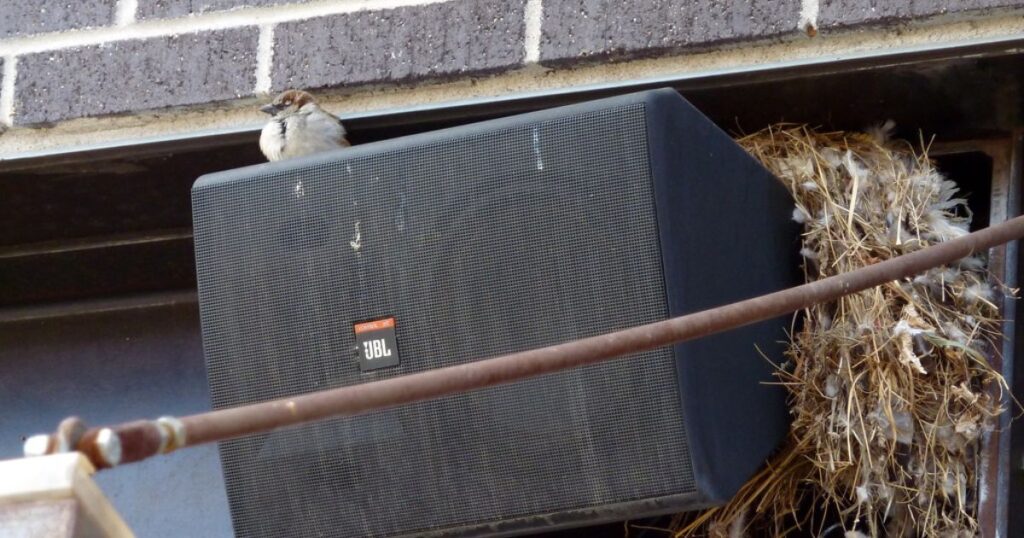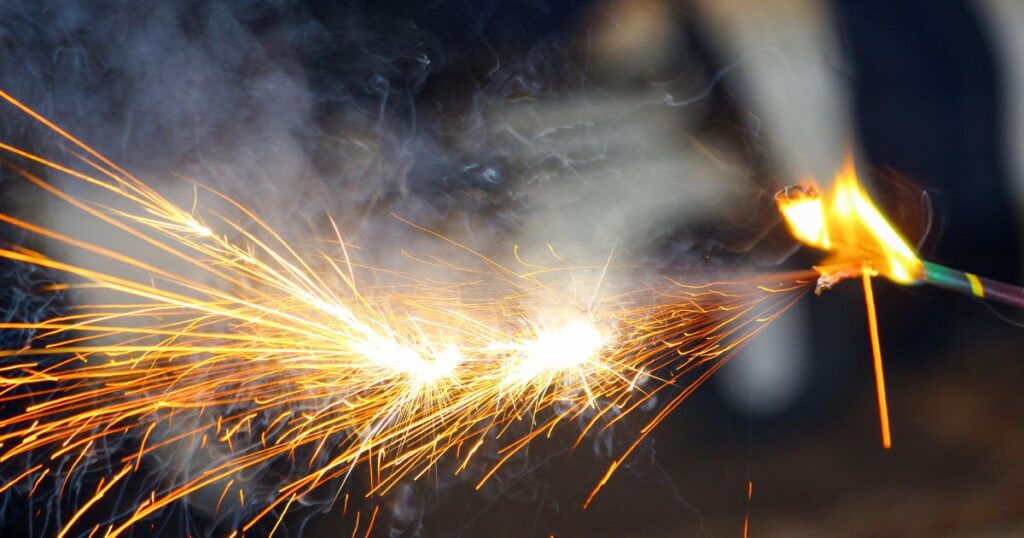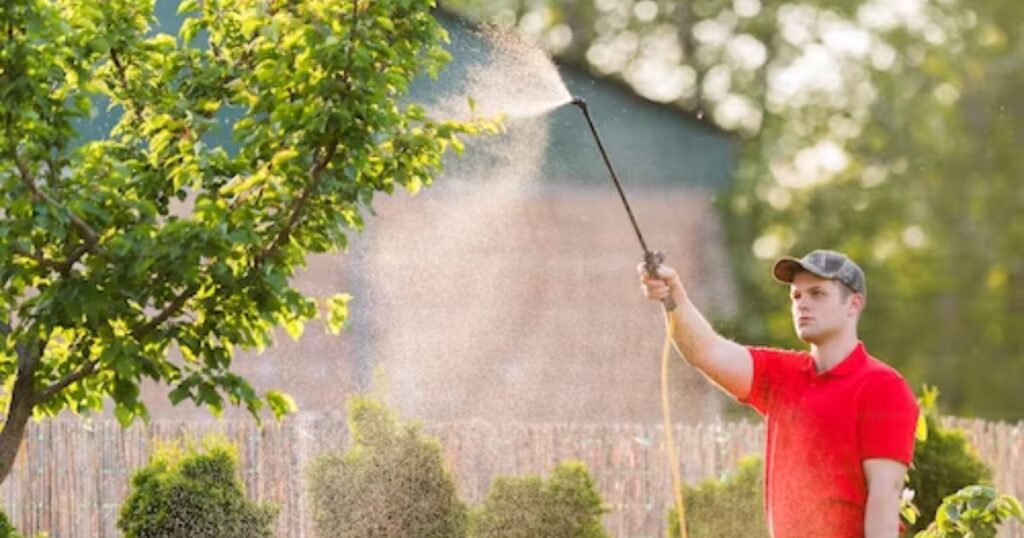What Are The Best Sounds To Scare Raccoons Away?
Raccoons are highly intelligent masked bandits that can easily cause havoc to our homes if allowed to roam freely. You have to know what to do when they find their way to your compound. Using sounds to scare raccoons away is one way.
But what are the best sounds to scare raccoons away? If you’re looking for noises and sounds that can effectively frighten raccoons when they come onto your property, here are some proven repellents:
- Loud shouting
- Pots and pans clanging
- Wind chimes jingling
- Human voices on the radio
- Animal recordings, such as loud dog barks,
- Firecrackers popping
- Predator calls, such as owl and coyote sounds
All these sounds will help keep the raccoon out of your home and yard. But for effective repellent, you want to either iterate these sounds or combine them with other deterrents. Read more to learn how these sounds work.
7 Best and Effective Sounds to Scare Raccoons Away
While raccoons cause no harm in natural spaces and play beneficial ecosystem roles, their presence in neighborhoods can become problematic. They may also unintentionally spread parasites and disease if they utilize a yard as a latrine site.
As resourceful creatures, preventing their access requires dissuading them from viewing a property as a food resource and potential nesting site. Understanding what intimidates raccoons can help homeowners implement non-harmful deterrents to keep these animals at an acceptable distance. Below are some of the most effective sounds to scare raccoons away:
Shouting

Loud shouting is a highly effective short-term solution for scaring raccoons. It’s an instinctive response most people have when they face a wild animal. If you see any signs of a raccoon or encounter it in the yard or on the property, shouting in a deep, loud voice will startle them and send them fleeing immediately.
However, raccoons may get used to regular shouting over time. To use this method, long-term requires varying vocal tones and increasing unpredictability.
Pots and Pans

Hitting pots and pans together or striking them with a wooden spoon makes a loud clunking noise that raccoons hate. Studies have shown this noise is very effective at scaring raccoons. The loud metallic banging disturbs raccoons and startles them away from the property.
Homeowners have used this technique successfully to keep raccoons out of trash cans, sheds, and other areas. Pots and pans provide a simple and inexpensive solution that is proven to scare raccoons.
Wind Chimes

Hanging wind chimes around the yard produce a noise raccoons deeply dislike. However, wind chimes alone will not be effective long-term as raccoons can habituate to the sound. To keep raccoons away, the location of wind chimes must be frequently changed.
Varying the type of wind chimes used, such as between high-pitched and low tones, can make the noise seem unpredictable to raccoons and prevent habituation. Wind chimes provide a passive sound deterrent that requires minimal effort once set up.
Radios

Setting radio-to-talk radio stations mimicking human voices effectively scares raccoons away from the property. Raccoons fear humans and noisy areas with human activity. The radio simulates a threatening human presence that raccoons want to avoid.
Moving radios to different areas periodically and varying stations helps prevent raccoons from adjusting to the noise. Radios are a cost-effective and hands-free solution to keep raccoons at bay.
Predator Calls

Playing recordings of predators that hunt raccoons, such as owls, coyotes, and dogs, causes raccoons significant distress. Studies show these noises effectively send raccoons fleeing to safer grounds.
However, like other sounds, predator calls must be changed frequently and relocated to keep raccoons afraid. While loud and jarring to raccoons, predator calls do not actually endanger the animals. This proven technique allows homeowners to comfortably scare raccoons non-invasively.
Firecrackers

The explosive sound of firecrackers is tremendously frightening to raccoons. Carefully setting off firecrackers away from homes and recording the sounds can drive raccoons away from an area for hours or even days.
Keep in mind continuous firecracker use may desensitize raccoons or cause other issues. This technique works best sparingly or for special occasions when extra deterrence is needed.
Combining deterrents and changing locations disrupts raccoons’ ability to feel secure. An integrated approach with sounds, scents raccoon hate, lights, and other methods creates enough uncertainty that raccoons seek safer grounds. Perseverance is also key, as repeat invaders may require several scare attempts before abandoning the area for good. With time and consistency using their worst sounds, homeowners can definitely keep unwelcome raccoons away.
How Often Should You Change Sounds To Scare Raccoons Away To Prevent Them From Getting Used To Them?
It’s important to vary the sounds you use regularly to prevent the raccoons from getting accustomed to any one deterrent. Raccoons are highly intelligent animals that can quickly learn patterns. If the same noise is used each time they approach an area, the raccoons will soon realize it poses no real threat.
To avoid habituation, you should change up the scare tactic every 3-4 nights at most. Experiment with various noises – pots and pans clanging, wind chimes, radios playing talk shows or predator sounds, firecrackers popping, and motion-activated sprinklers. Keep the raccoons guessing by rotating between multiple options on a short schedule.
You should vary the type of sound deterrent and the timing and location of when and where it’s used. Don’t always trigger the noise maker at the same parts of your property or only when motion is detected after dark. Activate deterrents randomly both during the day and night from different positions to further confuse the raccoons.
Make sure to cover your entire property with protection. Have multiple noise makers situated around the areas where raccoons attempt to enter, such as along fences. The more comprehensive your repellent system, the less likely gaps exist for raccoons to learn workarounds.
With consistent and varied use of audible deterrents on a tight rotation schedule, raccoons rarely learn there is nothing to fear. Keeping them constantly surprised and unsure is the best approach to remain an effective exclusion method over the long term for sound-based repellents. Perseverance is key to staying one step ahead of the clever raccoons.
What Are Some Other Effective Ways To Keep Raccoons Away From My Property?
Raccoons are smart, and keeping them away might take more than sounds. Here are 5 other effective ways to keep raccoons away from your property:
Remove Attractants

Raccoons are often drawn to areas by the availability of food and shelter. One of the best ways to deter them is to eliminate these attractants:
- Secure all trash in sealed bins and take bins in before sunrise to prevent raccoons from scavenging.
- Do not deliberately or accidentally feed raccoons. Clean up any outdoor pet food.
- Remove potential den sites like sheds, wood piles, or spaces under decks where raccoons can take cover.
Physically Excluding Raccoons
Creating physical barriers can keep raccoons from being able to access your property:
- Install fencing around vulnerable areas, like gardens or the perimeter of your property. Bury the bottom of the fence to prevent digging under.
- Cover entry points such as chimneys, attics, or gaps with 1/4-inch wire mesh. Raccoons can fit into very small spaces.
- Reinforce garage doors, pet doors, or other entryways with heavy-duty metal guards or screens.
Repellent Sprays

Applying repellent sprays containing predator odors can help deter raccoons:
- Look for sprays containing ingredients like pepper, putrescent whole egg solids, or predator urine crystals.
- Spray areas where raccoon activity is noticed, like garbage bins or fence lines. The strong smells mask other attractive scents.
- Reapply after rain or weekly for best results. The odors must stay potent to affect raccoon behavior.
Lights and Motion-Activated Sprinklers

Bright lights and motion-activated sprinklers can scare raccoons into staying away:
- Install outdoor motion-sensor lights near entry points so activity is easy to spot.
- Use sprinklers set to spray for 30 seconds whenever motion triggers them near entry areas. Raccoons dislike getting wet.
Trapping and Removal
As a last resort, trapping problem raccoons may be necessary if less invasive techniques fail:
- Live traps can be used, and problem animals can be relocated at least 5 miles away.
- Consult local regulations, which may require an official wildlife removal service to handle trapping and euthanasia if necessary.
Conclusion
Raccoons are clever animals that can become a nuisance if they frequent residential areas. Using a variety of sound and physical deterrents is the best approach to keeping raccoons at a distance without harming them. Combining loud noises like pots, pans, and radio static with repellent sprays and exclusionary barriers makes a property seem undesirable.
The key is changing up scare tactics frequently and randomly to prevent habituation. With proactive removal of attractants and a multi-pronged repellent strategy, the wily raccoons will eventually seek easier grounds that pose less disruption to their lives.




